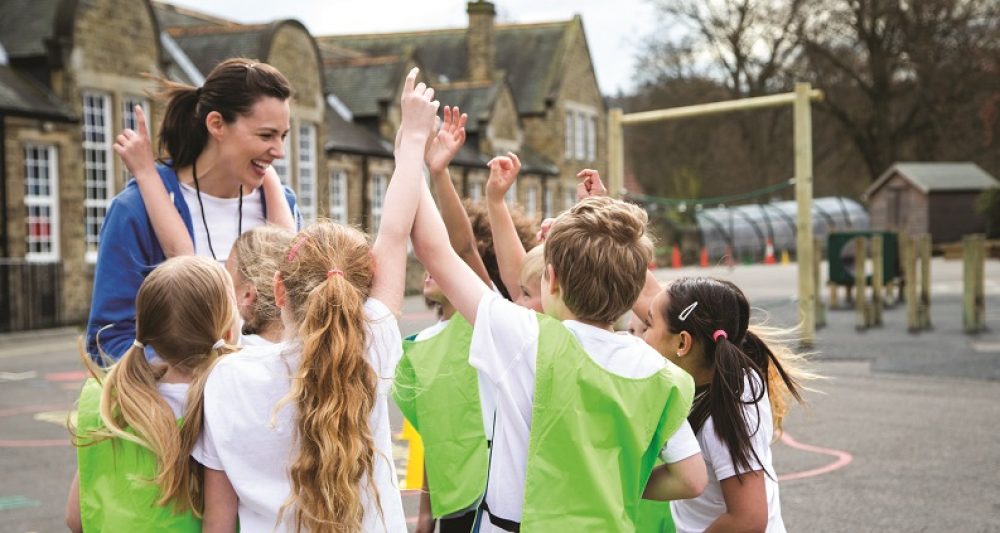Ministers will take action to get more pupils to play competitive sports in school, Damian Hinds has announced.
The education secretary has set out proposals for a new “school sport action plan”, which will aim to increase opportunities for pupils to play more sports and train more teachers to lead and coach those opportunities in schools.
Several national sports organisations, including the Premier League, the FA, England Netball and the RFU, will contribute to the plan, which will be published next spring.
We are all united in our desire to make sure that young people can benefit from an active lifestyle
The move, announced ahead of Hinds’s speech to the Conservative Party conference, follows the release of government statistics in August which show a decline in the participation in competitive sports among the youngest school pupils, despite PE remaining a compulsory part of the national curriculum.
A survey by the Department for Digital, Culture, Media and Sport found 55.6 per cent of five to ten-year-olds took part in organised sport competitions at school last summer, down from 62.4 per cent in 2016.
It also comes after Schools Week revealed how delays to the launch of the government’s proposed healthy schools rating scheme have left schools “in the lurch”, according to children’s health charities.
As well as providing more opportunities and training, Hinds’s new action plan, drawn up in partnership with sports minister Tracy Crouch, will aim to “increase the profile of competitive sport between schools”. However, is not yet known whether any new government money will be handed to schools to pay for the plan’s implementation.
“Whilst we have done a lot to support schools to deliver sport – including the introduction and then doubling of the PE and sports premium – we need to go further to make sure that every child, whatever their background, has the opportunity to explore different kinds of sport and take part in competition in the one – or the many – that they enjoy,” Hinds said.
“Government, schools, sports organisations – we are all united in our desire to make sure that young people can benefit from an active lifestyle. That’s why I am leading the development of a new cross government school sports action plan for more young people to have the opportunity to enjoy competitive sport.”
The move is not the first by the government to try to encourage more physical activity in schools.
Under the primary PE and sport premium, schools receive on average £18,000 of extra funding to make improvements to the quality of PE and sport they offer.
School games, a framework for competitive school sport, was launched in 2011 and aims to enable every school to participate in “meaningful competition”, including opportunities for disabled children. The scheme also includes a network of school games organisers and county sports partnerships, and currently has around 90 per cent of English schools signed up.
In the second chapter of its childhood obesity plan, published earlier this year, the government committed to a national ambition for every primary school to adopt an “active mile initiative”, such as the daily mile. Ministers also pledged to review how the least active children are engaged in physical activity and spend £1.6 million during 2018-19 to support walking and cycling to schools.
Sport England has also pledged to invest £13.5 million between now and 2021 to train more than 17,000 secondary PE teachers to “help foster a more positive attitude to physical education”.
The roll-out of the programme, run in partnership with the Teaching Schools Council, follows a pilot scheme run since May that involved 42 schools.



If the Government is trying to boost sports participation then their motive is to be applauded. However, I suggest looking at alternative, grassroots input to any forum is essential. Evidence suggests that Natonal Governing Bodies and the various Sports Quangos, despite big budgets, celebrity endorsement and massive media support are unable to stem the tide of rising inactivity and drop in participation figures. Parkrun is an example that shows there are other approaches that work.
However, if the motivation behind this Sports initiative is to improve the health of children then it is doomed to failure as statistics from the past 25 years prove. Those claiming that PE and school sport will transform the health of the next generation need a wake up call to break their propaganda stranglehold, political lobbying and self interest. Children’s health – physical, mental and cognitive needs a more holistic approach in partnership with education if it is to succeed.
Ministers and their policy advisers need to listen to other voices than those who woo their support with hospitality at sports events and celebratory dinners. As Einstein told us – you are insane if you keep doing the same oldthings and expect different results. 25years of approaching children’s health through PE and school sport has not worked – alternative, innovative approaches are long overdue.
Graham Morgan